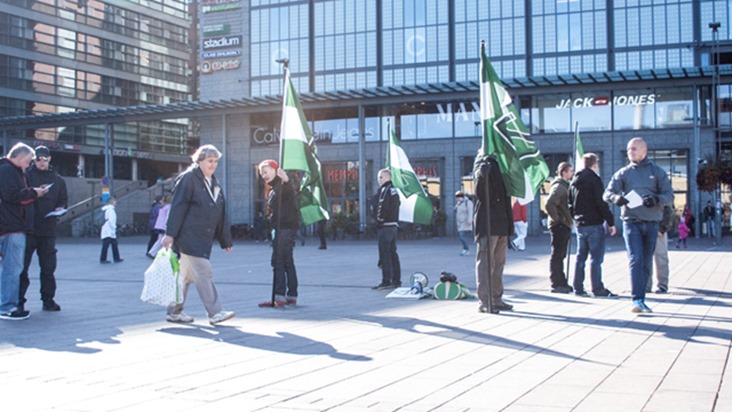Juuso Tahvanainen
Finnish Resistance Movement
October 2, 2014
The National Socialist organization Finnish Resistance Movement held a demonstration in the center of the Finnish capital city Helsinki. The activists engaged in lots of positive discussions with passers-by.
The main focus was on the international banking fraud and the growing influx of non-White ”cheap labour” to Nordic countries. We concluded that Finland must nationalize its banking system and separate from the European Union in order to create a healthy economy and combat the dispossession of the White Finnish workers and entrepreneurs. Important parts of the solution are also sealing the borders in order to fight unwanted immigration and denouncing the ideology of neo-liberalism and endless economic growth.
A down-to-earth message with focus on the economic well-being of the Finnish people attracted many locals. As the discussions proceeded and the locals gained more confidence (it’s not everyday you talk politics with an open National Socialist), we also brought up the racial question that is essential should we want to guarantee the welfare of upstanding Finnish citizens.
After the street activism we were joined by some of our support members. A hall had been prepared for us so that people could discuss and attend two lectures. The first lecture was held by Janne Kujala who spoke about the lessons that we had learned from the mistakes of other Finnish nationalist groups in the 1980’s and 1990’s. Kujala concluded that professionalism is the key to reaching long-term goals and growing as a movement.
Next speaker was Juuso Tahvanainen who spoke about the day’s economic theme. Tahvanainen shed light on the history of the National Socialist economic school, brining up people like Gottfried Feder but also C. H. Douglas, Ezra Pound and the radical Finnish war hero Paavo Susitaival. Tahvanainen’s message was that the fight against interest slavery must be brought to Finland. He also spoke about the importance of a corporativist solution to the problem of materialism and class tensions.



